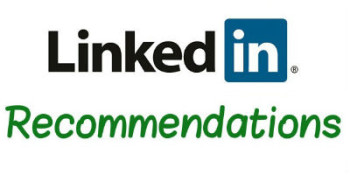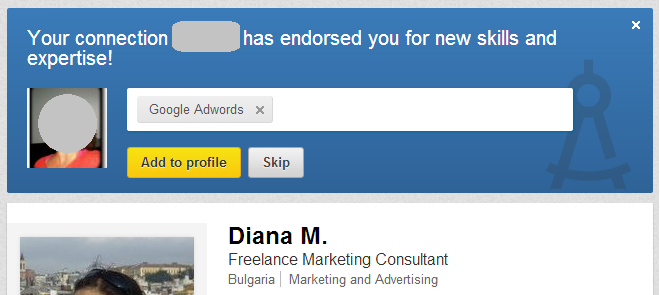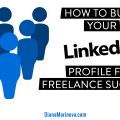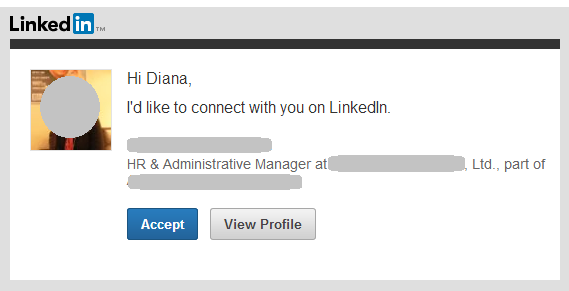 The idea for this post came as a result of a tweet conversation I had a couple of months ago with a fellow blogger. I think he confused LinkedIn endorsements with LinkedIn recommendations; we started discussing it and ended up with a blog post topic. So, what are LinkedIn Recommendations and why should you care?
The idea for this post came as a result of a tweet conversation I had a couple of months ago with a fellow blogger. I think he confused LinkedIn endorsements with LinkedIn recommendations; we started discussing it and ended up with a blog post topic. So, what are LinkedIn Recommendations and why should you care?
Let me outline really quick the difference between LinkedIn endorsements and LinkedIn recommendations.
You give endorsements on LinkedIn with one click, often in bulk, and most often as a result of LinkedIn offering you to do so. More often than not LI endorsements don’t mean anything, really. It could have been a great feature but it is heavily abused by LI members and for that reason – useless. Check out my post about LI endorsements if you have not read it before.
LinkedIn recommendations on the other hand, are super useful. They are very different from endorsements. I don’t recall LinkedIn ever urging me to leave a recommendation. To the contrary – you have to make an extra effort to recommend someone for something.
In brief, the steps are: go to their profile, ignore the endorse button and click the little arrow next to it; choose “Recommend” from the drop down menu and then – select where you have worked with this person and what was your relationship (colleagues, reported to them, they reported to you, different departments, etc.); write your recommendations and after sending it – wait for the other party to approve it for public publishing on their profile.
As you can see – it is not only harder to leave a recommendation to someone; you need to have actually worked with them to do so. This is a prerequisite for honest review and I am sure LI members who use the professional network properly, don’t ask random people for false recommendations.
If you don’t have LinkedIn recommendations, it won’t hurt you.
Maybe you are new to LinkedIn. Or maybe you don’t have a lot of completed projects just yet to ask for recommendations. Or maybe your colleagues who can recommend your work are not on LinkedIn. Whatever the case – don’t worry. It is better to have LI recommendations but it is not the end of the world if you don’t (yet).
There are some benefits for you if you have LI recommendations though.
To name a few:
- you are more visible and better positioned in searches
- it adds credibility and value to your profile
- people who are looking for new team members may be more inclined to hire you if you have a recommendation, especially if it is by someone in their own network
You should know that although recommendations are reassuring, they are rarely a deciding factor to hire you or not.
To take advantage of the above benefits, ask for recommendations on LinkedIn.
Not many people give recommendations to their connections without being asked first. Having said this, make sure you ask for the recommendations you want to get.
When asking, be specific. Ask only when you have worked with someone and you know they are happy with your work. Otherwise, you risk getting no recommendation or even worse, getting a bad reference.
A good practice to get more LI recommendations is to give them first. If you want someone to recommend your work, you recommend theirs first. Then they will be more inclined to return the favor and write a recommendation on LinkedIn for you.
In any case, you should ask and remember the above rules – be specific and be sure the person you ask for a recommendation is happy with your work.
I realize this post will probably raise more questions and lead to more posts about LinkedIn recommendations – how to ask for them, how to write them, should you always display all of your recommendations, what about recommendations on pages, etc. So let me ask you –
How much weight do you give to LI recommendations? Is there anything about them you dislike or don’t understand?
P.S. I have decided to be more active on LinkedIn this year so I invite you to connect with me! Remember to customize your connection invite though, I never accept the default message 😀





I get endorsements from people I have no idea who they are or where they came from. I do feel the advantage is it adds credibility and value to your profile. I don’t like Linkedin requesting after I get endorsements to endorse someone I have no idea who they are as well.
I second your opinion of endorsements, Arleen – good thing it’s different with LI recommendations though – they do count 😉
This is such a good thing to clarify. Many don’t understand the difference.
I receive both. I will say I do covet recommendations. They are, as you said, are a much more powerful over endorsements because they take thought, time and real consideration when creating them by or for others. I have asked and have received many recommendations. Every now and then I receive some that are unsolicited and that is such a nice surprise. I also don’t show all the recommendations I’ve receive on my profile. Not because they aren’t good, but because they aren’t relevant to my current situation.
The LI endorsements can have some value because, over time, you can see where the largest numbers fall. This can indicate areas you are perceived as having an expertise. It has been interesting to watch how mine look at the moment. 🙂
You make a VERY good point, Susan – two of them actually 😀 I love how you hide some of your recommendations because they are not relevant to your current state (of mind, work, stage of life, etc.).
As for the endorsements showing how people perceive you – i haven’t thought of that before, nice addition to the conversation, thanks!
Diana,
This is a good topic to build awareness of. There’s a huge difference between LinkedIn endorsements and recommendations. As you say, it is so easy to endorse someone that they can almost become a throw-away while a recommendation takes a lot more effort and thought. I value endorsements from people who I recognize and respect but I sometimes question why someone who I have no real connection with has chosen to endorse me. Possibly, they liked something I said online or possibly my blog.
On the other hand, when someone has taken the time to recommend me, that’s not something that I will forget. So, that recommendation helps to reinforce the connection between us.
Great post!
Good point, Sherryl – recommendations do reinforce the connection, well said!
As for endorsements from strangers – there are many people who endorse others ONLY hoping to get endorsed back out of courtesy… 🙁
I can not recommend some one I have not worked with. I don’t mind endorsements, and I agree with Susan, that they can add some value to your profile. Recommendations..well, don’t recommend me, if you’re not familiar with my work. I might not live up to it. Blessings.
That’s the beauty of LI recommendations, Johnny – more often than not, they are genuine and well deserved 😀
I agree with you on every point you have made here, Diana. Endorsements are nice, but recommendations provide PROOF.
In this day and age, where anyone can say anything, it’s great to have social proof to show future clients that you’re a trustworthy person who does, indeed, possess the qualities and skills outlined in your profile.
And thank you for the recent recommendation you have given me! I love it! 🙂
Great point, Lorraine – LI recommendations are indeed a proof you are trustworthy professional, well said!
And you’re welcome – job well done calls for a deserved recommendation 😉
I believe LinkedIn recommendations are very important to have on your LinkedIn profile, particularly from former bosses, clients and colleagues you have worked with closely. Unless you pay for the Premium version of LI, you don’t know who might have viewed your profile for a potential job or consulting assignment.You’re suggestions about how to go about giving and getting recommendations are spot on. I will only endorse people I respect and have worked for and would expect people who recommend me to feel the same way. Endorsements, on the other hand, as you mention, are pretty worthless unless it’s a business colleague you’d like to give a shout-out to.
Thanks for your comment, Jeannette – i like your suggestion of endorsing a colleague (i mean, giving a LI endorsement) as a quick shout-out to that colleague. That gotta be the most fun way of using LI endorsements i have heard of so far 😀
The recommendations are excellent. People have to take the time to write something about you, they have to give it thought. It’s the opposite of the often thoughtless click that the endorsements represent. People who have never worked with me will endorse me. My recommendations are all from people who’ve had the legitimate pain of dealing with me in the office. 🙂
ha-ha, are you really that bad to work with, Debra – LOL, just kidding. “Knowing” you for a while now and i suspect you and I are a lot alike – we have our working styles and once a team member (or subordinate) gets used to our working style, we are the most easy-going people to work with. But if one doesn’t adapt quickly – we can be a pain in the you know what, yes? 😀
Yes, Diana, that captures it perfectly. 🙂
Thanks for taking my idea into consideration and writing up this fantastic post! I’ve connected on Linkedin and expecting a recommendation. 😛 Just kidding!
Cheers
ha-ha, you got me there for a second, Nabeel! Thanks for sopping by and again, thanks for the post idea 😉